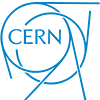European Organization for Nuclear Research (CERN)

CERN, the European Organization for Nuclear Research, “where the Web was born”, is funded by 20 European member states and has a yearly budget of approximately 1,000 MCHF. CERN has 2,250 permanent staff coming from the 20 member states and hosts about 10,000 High Energy Physics (HEP) scientists from all over the world. CERN houses and operates the Large Hadron Collider (LHC), which is be the world’s largest and most powerful scientific instrument, providing data to four experiments each with up to 3,000 scientists and engineers coming from more than 250 institutes.
The LHC generates data at the rate of around 25 Petabytes per year, and will continue for at least 10 years. This data is shared with all the participating scientists looking for discoveries to understand the fundamental laws of nature. These analyses need the combined resources of some 200 computer centres world-wide. CERN has chosen Grid technology to address the huge data storage and analysis challenge of LHC and tuns the WLCG (World-wide LHC COmputing Grid) for this purpose. CERN has prominently contributed, and contributes today in the context of the Framework Programmes to dozens of EC co-funded grid projects[1] and coordinated the EGEE-III project that operated the largest multi-disciplinary grid infrastructure in the world.
The CERN charter, over half a century ago, enshrined that “… the results of its experimental and theoretical work shall be published or otherwise made generally available” and this has inspired the CERN Library to play a leading role in both European and worldwide Open Access movements, aiming to provide anyone with immediate and free access to the results of scientific research. In this context CERN is proposing SCOAP3, an innovative Open Access business model.
Leading Open Access vision and IT innovation come together at CERN through the development of Invenio, an Open Source digital library platform which powers the CERN Document Server, CERN institutional repository, and is the basis for INSPIRE, the next-generation High-Energy Physics discipline repository. The Invenio technology has also been transferred to dozens of other institutions in the world, from the sciences to the arts, from private foundations to political institutions.
Contact persons
- Tim Smith
- Lars Holm Nielsen
- Jose Benito Gonzalez Lopez
- Alex Ioannidis
[1] SOAP (coordinator, 230220), PARSE.Insight (223758), EGEE-III (coordinator, 222667), SEE-GRID-SCI (211338), BalticGrid-II (223807), D4Science (212488), ETICS 2 (coordinator 223782), GridTalk (223534), EGI_DS (211693). EELA (026409), EuChinaGrid (026634), EuMedGrid (026024), BalticGrid (026715), SEE-GRID (002356), SEEGRID-2 (031775), Health-e-Child (027749), DILIGENT (004260), ICEAGE (026637), OMII-Europe (031844), ISSeG (coordinator 026745), ETICS (coordinator 026753), EGEE (coordinator 508833) EGEE-II (coordinator 031688), GRACE (coordinator 38100), DATAGRID (coordinator 25182)
OpenAIRE-Advance, OpenAIRE-Connect, OpenAIRE2020
